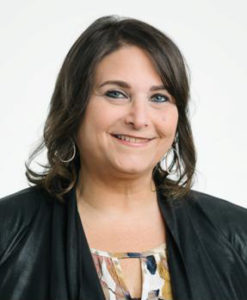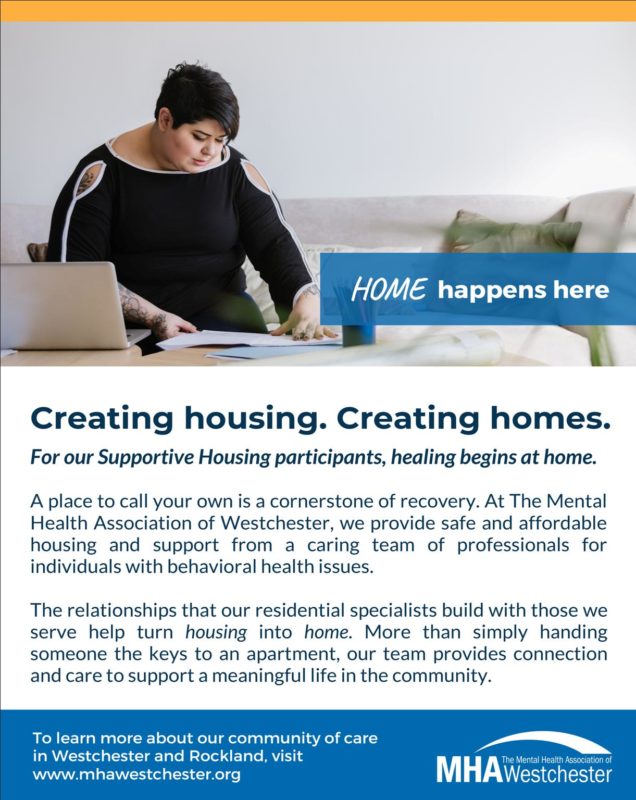The philosophy of The Mental Health Association of Westchester’s (MHA) housing services and supports is rooted in the principles of person-centered practice and the belief that individuals with behavioral health conditions—even those with histories of instability or little experience of living in the community—have the right to make choices with regard to their living, working and social environments, and that making their own choices will speed recovery. The person-centered approach relies less on the service system by establishing truly individualized, natural, and creative supports to achieve meaningful goals based on the individual’s strengths and preferences. The person-centered approach facilitates the creation of a team of people who know and care about the individual, who come together to develop and share a dream for the individual’s future, and who work together to organize and provide the supports necessary to make that dream a reality.

Ruthanne Becker, MA
Lorraine (not her real name) and Karlyn Jackson, Program Director of MHA’s Supportive Housing, have worked together at MHA for more than a decade in order to make Lorraine’s dream a reality. When Lorraine was first referred to MHA’s Supportive Housing, she was living in a shelter for women whose lives were impacted by domestic violence. She had been at the shelter for about a year. During this time Lorraine was in and out of the hospital dealing with the physical impact of her attack. She was involved with a variety of social service agencies dealing with the trauma she had endured as well as with the District Attorney’s (DA) office, which was trying to ensure that her abuser remained behind bars. When asked about this time in her life, Lorraine is very candid but remembers very little. However, the one thing that remains very clear to her is that she walked away with nothing. “Just the clothes on my back,” she recalls. Karlyn adds “She left her life without her clothing, memories, furniture or ID.” Lorraine describes feeling very scared – scared to leave the shelter, scared to even think about living on her own. Lorraine and Karlyn knew safety would be their first priority. With Karlyn’s help, Lorraine decided that she wanted to move back to her hometown, “near mom.”
Both recall driving around that town looking for apartments to rent, and they acknowledge that it was during these rides and the related meetings where they looked at “For Rent” advertisements that their relationship developed. In a 2004 study, Recovery-oriented Professionals: Helping Relationships in Mental Health Services (Berg et al., 2004), the authors found that “Human qualities seem to matter much more than titles, professional training backgrounds or methods used. Unexpected acts and ways of being, and helpers that go out of their way to give something extra are greatly valued. When both helper and user are willing and able to expose their ‘human’ side, daring to be themselves and disclosing a bit of who they are on the inside, mutual collaboration seems to be more likely. More than just collaboration, this shared disclosure is in itself experienced as important if not essential in recovery.” Lorraine acknowledges that she was just learning to trust again and that Karlyn’s persistence, care and warmth made it easy to accept that this person wanted to help and not hurt her. At the same time, Karlyn says that Lorraine was teaching her about resiliency, risk taking and learning to trust again.
Eventually, Lorraine found an apartment that she felt safe in, and Karlyn worked with Lorraine, the landlord and the DA’s office to secure permission and funding to add additional locks to the front door. For Karlyn, handing the apartment keys to Lorraine still stands out as a momentous day in her career. Once housing was procured, Lorraine and Karlyn started the process of looking towards the future. Furniture and household items were selected and purchased. One of the priorities that Lorraine identified was to find a psychiatrist who was near to home and who would be consistent – she struggled with telling her story over and over. Karlyn was able to connect her to someone close by whom Lorraine still continues to see. Next was Lorraine’s strong desire to return to work. It took some time, but eventually Lorraine returned to work and she currently works part time in a job she truly enjoys.
Lorraine reports that most days she is happy and healthy, but on those days and even weeks when she is struggling, she knows she has someone to whom she can turn for support and guidance. Karlyn has been there through the good and bad. She has been a consistent helper who doesn’t judge or act punitively. Lorraine frequently speaks of Karlyn’s kindness and compassion, and both acknowledge that each has helped the other to grow and change. Because Supportive Housing is permanent housing, Karlyn and Lorraine have enjoyed a long working relationship which has enabled them to collaborate on short- and long-term goals. According to Lorraine, the consistency of having one person over a long period of time has enabled her to see her own growth and progress. She also notes that when she is struggling, Karlyn will often be the first to notice. This is a common assertion of Supportive Housing tenants and staff because visits take place in the tenant’s apartment/home and staff can observe subtle and not-so-subtle changes in the home and interpersonal relationships with friends and family.
Lorraine’s story is special but not unique. Supportive Housing has been recognized as an Evidence Based Practice for decades. Unfortunately, the need for Supportive Housing services far surpasses the number of Supportive Housing beds that are available in Westchester County. According to the Program Director of Community Support Services at Westchester County Department of Community Mental Health (DCMH), in 2019, 1,385 individuals were on the Single Point of Access (SPOA) waitlist for Supportive Housing. According to DCMH, “[DCMH] established SPOA to remove barriers to successful community living for adults with serious mental illness. The goal of the SPOA is to ensure service access to high-need individuals while increasing integration and community tenure.” Upon submission of the application and appropriate supporting documentation (comprehensive psychosocial assessment, psychiatric assessment including DSM-V diagnosis, hospital admission and discharge plan as appropriate, and consent to release information form), each request for service is reviewed at the housing and/or care management SPOA meeting. A service provider is assigned based on the type, level and availability of the service requested.
Supportive Housing is often lauded as the cornerstone of recovery. As one MHA Supportive Housing tenant said, “housing heals.” Without safe and affordable housing, it is extremely difficult to have the strength or the necessary supports to focus on recovery. Like Lorraine, many participants of Supportive Housing describe that it is more than the actual apartment that provides the healing. Often, it’s the relationship with the Supportive Housing team that helps spark a new sense of self. Tenants of MHA’s Supportive Housing have expressed that staff assistance with learning about and participating in their new community enables them to create or re-create their identity. They no longer identify with being “mentally ill”, “homeless”, or “a patient” but instead see themselves as a neighbor, a friend and a community member. This transition has been crucial to the tenants’ recovery as well as decreasing overall stigma in their communities.
Because Westchester County has one of the highest per capita income levels in the country, the problem of homelessness and lack of permanent housing, particularly for individuals with disabilities, is underestimated and hidden. Housing is critical for individuals impacted by domestic violence, behavioral health and/or substance use issues. Affordable housing is only available in Westchester County as a result of government-assisted programs. This housing is consumed within weeks of becoming available, and there are long waiting lists for any future developments. NYS Homes and Community Renewal (HCR) mandates this housing always be marketed via a lottery, due to high demand and limited availability. Adults living with long-term disabilities rely on Supplemental Security Income (SSI) and Social Security Disability Insurance (SSDI) to cover living expenses, but the benefit amounts have not kept up with the cost-of-living increases. Without participation in Supportive Housing or Section 8 Rental Assistance where rental amounts are 30% of an individual’s income, one could easily spend 100% of one’s monthly income on housing alone. While most of our clientele are eligible for Section 8 Rental Assistance, many have been on waiting lists for years.
Without stable and affordable housing, individuals diagnosed with behavioral health and co-occurring conditions can become trapped in a cycle of recovery and relapse. This cycle is often characterized by the repeated use of expensive community services such as hospital emergency rooms, inpatient hospitalizations and jails. MHA continues to explore opportunities to expand its Supportive Housing program in order to serve additional individuals and promote community inclusion. In 2019, MHA was one of four agencies in Westchester County conditionally awarded funding through the Empire State Supportive Housing Initiative (ESSHI). ESSHI is one component of the Governor’s $20 billion, five-year plan to create or preserve more than 100,000 affordable and at least 6,000 Supportive Housing units. The conditional awards are for service and operating funding needed to operate permanent Supportive Housing units. The award will allow MHA to secure separate capital funding to finance the development and construction of additional housing. Although in the early stages of development, MHA is hoping to eventually house 70 individuals: 35 individuals diagnosed with serious behavioral health issues who are currently homeless and 35 individuals who meet the eligibility requirements for low income housing. MHA will continue to provide warm, compassionate care, because we know that “housing heals”.
For more information about MHA’s Residential Services, please contact Ruthanne Becker at beckerr@mhawestchester.org or visit MHA’s website at www.mhawestchester.org.




